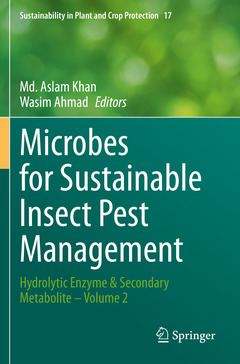Microbes for Sustainable lnsect Pest Management, 1st ed. 2021 Hydrolytic Enzyme & Secondary Metabolite – Volume 2 Sustainability in Plant and Crop Protection Series, Vol. 17
Coordonnateurs : Khan Md. Aslam, Ahmad Wasim

The search for new strategies of pest control with safer molecules is currently of great importance and interest. Microbe-mediated biological crop protection is an attractive and promising technology with no concern for a negative impact on the environment and biodiversity. Microbial hydrolytic enzymes such as proteases, chitinases, lipases, etc. are attractive for this purpose. They present toxic properties and act synergistically to control pest attacks. Also, some metabolites, that microorganisms produce for their survival or defense, can be explored and exploited for plant protection.
The focus of this Volume is on the potential of microbial hydrolytic enzymes and their metabolites in agroecosystem functioning. Subsequent chapters review topics such as microbial hydrolytic enzymes as powerful management tools, chitinases in IPM of agro-horticultural crops, metabolites as pesticides and the importance of the metabolites of entomopathogenic fungi, metabolites and virulence factors. Other topicas include: microbial-based nanoparticles, recombinant DNA technologies to improve the efficacy of microbial insecticides, the effects of entomopathogens on insect predators and parasitoids, and the management of major vegetable insect pests.
This Volume provides detailed accounts on the safe use of microbial products for sustainable management of insect pests. Its aim is to build solid foundations for the students, teachers, and researchers interested in eco-friendly management of important insect crop pests.
1. Microbial Hydrolytic Enzymes: Powerful Weapons Against Insect Pests
2. Microbial Hydrolytic Enzymes: Powerful Weapons Against Insect Pests
3. Hydrolytic Enzymes and Integrated Pest Management4. Microbial Metabolites as Pesticides
5. Unraveling the Importance of Metabolites from Entomopathogenic Fungi in Insect Pest Management
6. Toxic Secondary Metabolites and Virulence Factors Expression by Entomopathogenic Fungi during Insect Infection and Potential Impact as a Tool for Pest Management
7. Microbial-based Nanoparticles as Potential Approach of Insect Pest Management
8. Role of Recombinant DNA Technology to Improve the Efficacy of Microbial Insecticides9. Effects of Entomopathogens on Insect Predators and Parasitoids
10. Biological Management of Major Vegetable Insect Pests with macro- and microorganisms
11. Biorational Approaches for the Management of Insect Pests of Vegetable Crops
Wasim Ahmad Ph. D (1981), D. Sc (1993) in Nematology (Zoology) from Aligarh Muslim University is a Professor (full) of Nematology at Department of Zoology, Aligarh Muslim University, India. He has wide experience of working in leading Nematology laboratories of the world and has published extensively on nematode taxonomy, ecology and the role of Entomopathogenic nematodes in insect biocontrol. He is recipient of several national and International awards and is Fellow of the National Academy of Sciences (FNASc) and the National Academy of Agriculture Sciences (FNAAS) India.
The only available book that provides an updated knowledge on microbial products mediated biological control
Volume is compiled with the contribution of legend workers in insect pest management
This volume is expected to be of great help to post-graduate students and researchers in plant protection
Date de parution : 04-2022
Ouvrage de 274 p.
15.5x23.5 cm
Disponible chez l'éditeur (délai d'approvisionnement : 15 jours).
Prix indicatif 242,64 €
Ajouter au panierDate de parution : 04-2021
Ouvrage de 274 p.
15.5x23.5 cm
Disponible chez l'éditeur (délai d'approvisionnement : 15 jours).
Prix indicatif 242,64 €
Ajouter au panier


